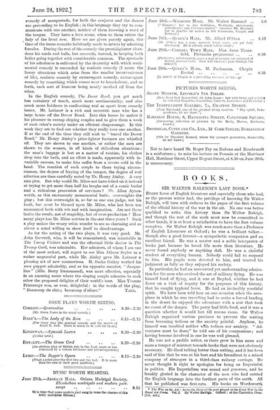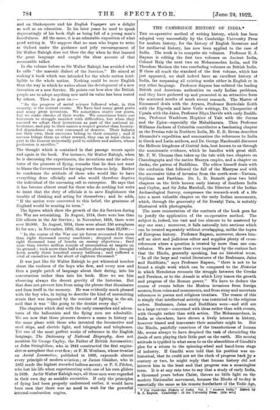BOOKS.
SIR WALTER RALEIGH'S LAST BOOK.* EVERY lover of English literature and especially those who had, as the present writer had, the privilege of knowing Sir Walter Raleigh, will turn with sadness to the pages of the first volume of the official history of the war in the air. No one was better qualified to write this history than Sir Walter Raleigh, and though the rest of the work must now bo committed to other hands, it is at least a satisfaction to have the first volume complete. Sir Walter Raleigh was much more than a Professor of English Literature at Oxford ; he was a brilliant talker— though also a good listener—a sympathetic companion g.nd an excellent friend. He was a master and a noble interpreter of books just because he loved life more than literature. He never found anybody or anything dull. He was a cheerful student of everything human. Nobody could fail to respond to him. His pupils were devoted to him, and trusted his judgment as fully as they enjoyed his society.
In particular, he had an unreserved yet understanding admira- tion for the men who evolved the art of military flying. He was himself fond of flying, and it was at Bagdad, whither he had flown on a visit of inquiry for the purposes of this history, that he caught typhoid fever. He had an invincibly youthful spirit. We have been told how on one occasion when the aero- plane in which he was travelling had to make a forced landing in the desert he enjoyed the adventure with a zest that took no count of the danger. The party had little food, and it was a question whether it would last till rescue came. Sir Walter Raleigh organized various pastimes to prevent the waiting from becoming tedious or the anxiety painful. Anyhow, he himself was troubled neither with tedium nor anxiety. " Ad- ventures must be done," ho told one of his companions ; and having become involved in one he was well pleased.
He was not a prolific writer, as there grew in him more and more a temper of mistrust towards books that were not obviously necessary. He liked talking better than writing, and it has been said of him that he was at his best and his friendliest in a mixed company of strangers in a third-class railway carriage. Ho never thought it right to apologize for being an Imperialist in politics. His Imperialism was sound and generous, and he frankly gloried in the character of the men who had carried the English language into the furthest parts of the earth. All that he published was first-rate. His books on Wordsworth
• The War in the 44 : being the Story of the part plaoed Oath. Great War by as Royal A* Fora. Vol. L By Walter Raleigh. optora : at the Clarendon Press. [21s. net.] and on -Shakespeare and his English Voyagers are a delight
as well as an education. In his later years he used to speak deprecatingly of his book Style as being full of a young man's fancifulness. All the same, it is an admirable exposition of what good writing is. We suppose that no man who began to write at Oxford under the guidance and jolly encouragement of Sir Walter Raleigh does not bless the day when he first learned the great language and caught the clear accents of that memorable talker.
In the volume before us Sir Walter Raleigh has avoided what he calls " the masonic dialect of the Services." He aimed at making-h. book 'which was intended for the whole nation intel- ligible to the whole nation. Nothing could be more English
than the way in which he writes about the development of a new invention or a new Service. He points out how slow the British
eople are to adopt anything new until its value has been tested by others. Then he goes on:— "So the progress of aerial science followed what, in this country, is the normal course. We have had many great poets and many groat inventors. We sometimes starve our poets, but we make classics of their works. We sometimes leave our Inventors to struggle unaided with difficulties, but when they succeed we adopt their inventions as part of the national in- heritance, and pay to their names a respect greater than bounty- fed dependence can ever command or deserve. Their failures are their own, their successes belong to their country ; and if success brings them no other reward, they can at least claim a part in the honour universally paid to soldiers and sailors, whose profession is sacrifice."
The thought which is contained in that passage recurs again and again in the book. For instance, Sir Walter Raleigh, when he is discussing the experiments, the inventions and the adven- tures of the pioneers of flying, remarks that he does not want to blame the Government for having given them no help. Rather
he condemns the attitude of those who would like to have everything done officially and who would therefore deprive the individual of the unceasing call to enterprise. He says that it has become almost usual for those who do nothing but write to insist that the duty of officials is to save Englishmen the trouble of thinking and acting for themselves ; and he adds, If the nation were converted to this belief, the greatness of England would be nearing its term."
The figures which show the growth of the Air Services during the War are astonishing. In August, 1914, there were less than 250 officers in the Air Service ; in November, 1918, there were
over 30,000. In August, 1914, there were about 150 aeroplanes fit for use ; in November, 1918, there were more than 22,000 :- " In the course of the War our air forces accounted for more than eight thousand enemy machines ; dropped more than sight thousand tons of bombs on enemy objectives ; fired more than twelve million rounds of ammunition at targets on the ground • took more than half a million photographs P • brought Sown nearly three hundred enemy balloons ; and suffered a Eotal of casualties not far short of eighteen thousand."
It was just like Sir Walter Raleigh to put whimsical touches about the coolness of the boys who flew, and every now and
then a purple patch of language about their daring, into his conversation rather than into his book. Here we see him observing always the decent gravity of the historian. But that does not prevent him from using the phrase that illuminates and fixes itself in the memory. He was evidently much pleased with the boy who, in trying to describe the kind of unremitting strain that was imposed by the routine of fighting in the air, said that it was "like going to the dentist every day." The chapters which deal with the early researches and adven- tures of the balloonists and the flying men are admirable. We see now that these pioneers deserve a name in history on the same plane with those who invented the locomotive and steel ships, and electric light, and telegraphs and telephones. Yet one of the most perfect works of reference in the English language, The Dictionary of National Biography, does not mention Sir George Cayley, the Father of British Aeronautics ; or John Stringfellow, who in 1848 constructed the first engine- driven aeroplane that ever flew; or F. H. Wenham, whose treatise on Aerial Locomotion, published in 1866, expounds almost every principle of modern aviation ; or James Glaisher, who in 1862 made the highest recorded balloon ascent; or P. S. Pilcher, who lost his life when experimenting with one of his own gliders in 1899. As Sir Walter Raleigh says, all these men were regarded in their own day as amiable eccentrics. If only the principles of flying had been properly understood earlier, it would have been seen that there was no need to wait for the powerful internal-combustion engine.



































 Previous page
Previous page